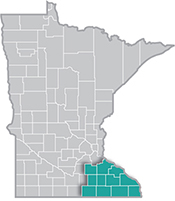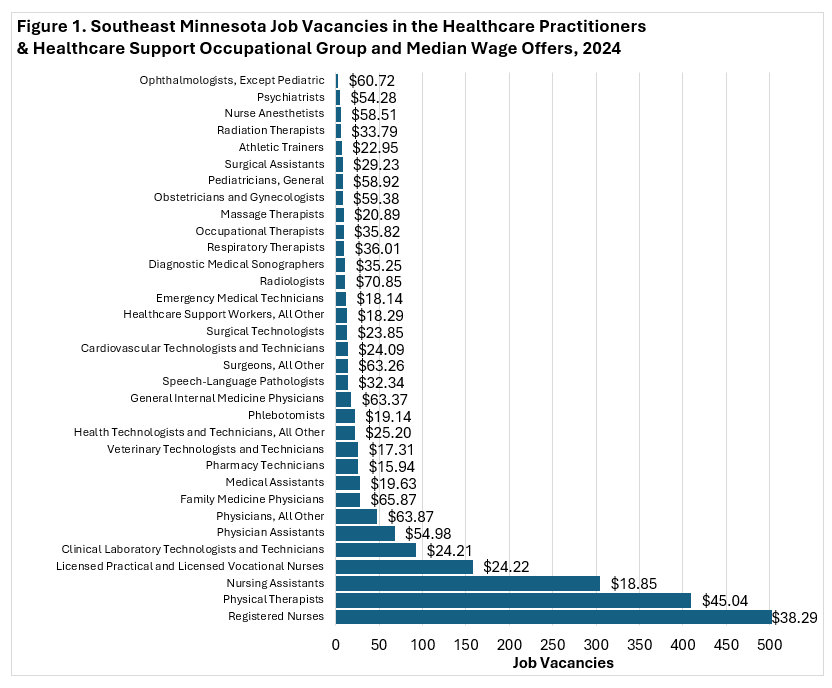 Southeast Minnesota is a health care and agricultural powerhouse. The region is home to the renowned Mayo Clinic and some of the world's most recognized food companies and brands.
Southeast Minnesota is a health care and agricultural powerhouse. The region is home to the renowned Mayo Clinic and some of the world's most recognized food companies and brands.
Advanced manufacturing is especially strong here, with machinery, chemicals, and electronics among the top products.
Want the freshest data delivered by email? Subscribe to our regional newsletters.
The industry now employs more than one in four workers in the region
5/20/2025 10:52:56 AM
Amanda Blaschko
In Southeast Minnesota, the Health Care & Social Assistance industry creates jobs, drives economic growth and provides stable career paths for tens of thousands of residents. The industry now employs more than one in four workers in the region, offering above average wages that support families and generate additional economic activity throughout local communities. While Manufacturing, Retail Trade and other sectors remain important to the region, Health Care stands out for its significant contribution to Southeast Minnesota's economy, adding new positions even as employers would fill even more openings if more workers were available.
Southeast Minnesota stands out as the leading planning region in Minnesota for Health Care employment. New 2024 annual data from the Quarterly Census of Employment & Wages show the Health Care & Social Assistance industry now makes up 27.6% of all employment in the region, far higher than anywhere else in the state. Northeast ranks second with 24.1% of jobs in Health Care, while the state overall and the rest of the regions are around 18% of total employment.
In actual numbers, Southeast Minnesota has 68,183 jobs in Health Care & Social Assistance, out of 247,013 total jobs. Last year the region added 1,741 Health Care jobs, growing at 2.6% while total regional employment grew at 1.2%. Within Health Care, the four major subsectors showed varying growth patterns. Social Assistance led the way with the highest percentage growth at 4.8% (+310 jobs), followed closely by Nursing & Residential Care Facilities at 4.2% (+444 jobs). Ambulatory Health Care Services, which includes physician offices and outpatient care, increased by 2.7% (+897 jobs). Meanwhile, Hospitals showed the most modest growth at 0.6% (+89 jobs), though still adding jobs.
| Table 1. Industry Employment Statistics, Southeast Minnesota | 2024 | 2023-2024 | 2019-2024 | ||||
|---|---|---|---|---|---|---|---|
| Industry | Number of Jobs | Number of Establish-ments | Avg. Annual Wage | Change in Jobs | Percent Change | Change in Jobs | Percent Change |
| Total, All Industries | 247,013 | 13,711 | $66,560 | +2,953 | +1.2% | +205 | +0.1% |
| Health Care & Social Assistance | 68,183 | 2,048 | $87,360 | +1,741 | +2.6% | +1,925 | +2.9% |
| Ambulatory Health Care Services | 34,677 | 511 | $114,712 | +897 | +2.7% | +1,497 | +4.5% |
| Offices of Physicians | 28,718 | 63 | $125,424 | +590 | +2.1% | +1,110 | +4.0% |
| Offices of Dentists | 1,620 | 144 | $73,892 | +80 | +5.2% | +121 | +8.1% |
| Offices of Other Health Practitioners | 1,151 | 218 | $45,812 | +53 | +4.8% | +103 | +9.8% |
| Home Health Care Services | 945 | 41 | $39,780 | +90 | +10.5% | -250 | -20.9% |
| Other Ambulatory Health Care Services | 782 | 21 | $81,536 | +42 | +5.7% | N/A | N/A |
| Hospitals | 15,598 | 20 | $85,904 | +89 | +0.6% | +806 | +5.4% |
| Psychiatric & Substance Abuse Hospitals | 67 | 1 | $88,296 | +4 | +6.3% | -3 | -4.3% |
| Nursing & Residential Care Facilities | 11,074 | 290 | $38,532 | +444 | +4.2% | -525 | -4.5% |
| Nursing Care Facilities (Skilled Nursing Homes) | 4,557 | 63 | $39,416 | +239 | +5.5% | -1,054 | -18.8% |
| Residential Intellectual & Dev. Disability, Mental Health & Substance Abuse Facilities | 2,537 | 123 | $39,260 | +28 | +1.1% | -264 | -9.4% |
| Continuing Care Retirement Communities & Assisted Living Facilities for the Elderly | 2,931 | 71 | $37,076 | +139 | +5.0% | +817 | +38.6% |
| Other Residential Care Facilities | 1,049 | 34 | $37,076 | +39 | +3.9% | -23 | -2.1% |
| Social Assistance | 6,832 | 1,227 | $30,940 | +310 | +4.8% | +146 | +2.2% |
| Individual & Family Services | 4,480 | 1,091 | $30,212 | +225 | +5.3% | +258 | +6.1% |
| Community Food & Housing, & Emergency & Other Relief Services | 185 | 21 | $45,396 | +14 | +8.2% | +20 | +12.1% |
| Vocational Rehabilitation Services | 793 | 25 | $34,216 | +16 | +2.1% | -19 | -2.3% |
| Child Day Care Services | 1,373 | 90 | $29,640 | +54 | +4.1% | -113 | -7.6% |
| Source: Quarterly Census of Employment & Wages | |||||||
The pandemic's impact remains visible in the five-year data. From 2019 to 2024, while total regional employment barely grew at 0.1% (+205 jobs), Health Care & Social Assistance added 1,925 jobs, a solid 2.9% increase, showing the sector has fully recovered and surpassed pre-pandemic levels. During this period, Hospitals moved to the top position with 5.4% growth (+806 jobs), clearly exceeding their pre-pandemic employment levels. Similarly, Ambulatory Health Care Services showed strong recovery with 4.5% growth (+1,497 jobs). In contrast, Social Assistance grew more modestly at 2.2% (+146 jobs), though still ahead of pre-pandemic levels. Most strikingly, Nursing & Residential Care Facilities have not yet recovered, showing a decline of 4.5% (-525 jobs) compared to 2019, making it the only subsector still below pre-pandemic employment.
Wages in the Health Care & Social Assistance industry remain strong compared to other sectors. The average annual wage across this industry is $87,360, well above the $66,560 regional average for all industries. The four subsectors within Health Care & Social Assistance display significant wage variation. Ambulatory Health Care Services offers the highest wages by far at $114,712 annually. Hospitals follow in second place at $85,904. There is then a substantial drop to Nursing & Residential Care Facilities, which average $38,532. Social Assistance has the lowest average annual wage at $30,940 (Table 1).
Despite strong growth across most subsectors, significant job openings remain throughout the region's healthcare industry. The most recent Job Vacancy Survey results for Southeast Minnesota show 9,737 total job vacancies in 2024, with Health Care & Social Assistance accounting for nearly one-third (31.2%) of all openings. This high number of vacancies indicates substantial career opportunities throughout the healthcare field for job seekers with various education and skill levels.
Looking at specific occupational groups provides further insight into regional healthcare workforce needs. Healthcare Practitioners & Technical Occupations reported 1,716 job vacancies with a median wage offer of $37.89 per hour, which is $17.69 higher than the median across all occupations. Most of these positions (93%) require postsecondary education, while only 18% are part time and 2% seasonal.
Within this higher skilled group, five occupations account for nearly 72% of vacancies: Registered Nurses (503 openings), Physical Therapists (410), Licensed Practical & Licensed Vocational Nurses (158), Clinical Laboratory Technologists & Technicians (93), and Physician Assistants (68).
Meanwhile, Healthcare Support occupations reported 640 job vacancies with a median wage offer of $19.33 per hour, slightly below the regional median for all occupations. In this occupational group, 30% of positions are part time and only 30% require postsecondary education. Three occupations make up nearly 83% of all support role vacancies: Nursing Assistants (305 openings), Personal Care Aides (196) and Medical Assistants (28) (Figure 1).

Overall, Southeast Minnesota's Health Care & Social Assistance industry remains vital not only for patient care, but also for regional economic strength. Beyond providing essential medical services to residents, the industry creates thousands of jobs, offers wages above the regional average, and provides career paths for workers across education levels. With over 27% of regional employment and continued growth despite pandemic challenges, Health Care will continue serving as a key driver of Southeast Minnesota's economy while meeting the medical needs of communities throughout the region.
Contact Amanda Blaschko at amanda.blaschko@state.mn.us.
If you’d like to find out more about Health Care & Social Assistance career opportunities in Minnesota or if you are an employer looking to hire workers, contact staff at a CareerForce location near you.